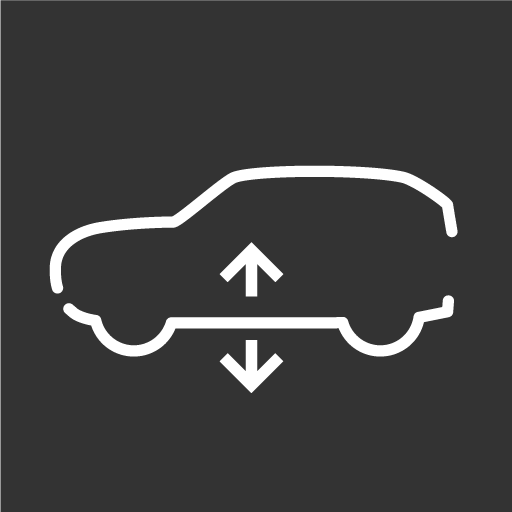Shock absorbers (Four-C)*
On vehicles equipped with Four-C, the shock absorbers are adapted to the selected drive mode and the current vehicle speed. The shock absorbers are normally set to help optimize comfort and are adjusted continuously according to the road surface and the vehicle's acceleration, braking and cornering.
On vehicles equipped with Four-C, the shock absorbers are adapted to the selected wheel suspension setting and the current vehicle speed. The shock absorbers are normally set to help optimize comfort and are adjusted continuously according to the road surface and the vehicle's acceleration, braking and cornering. If a stiffer chassis is desired, set the wheel suspension to Suspension feel firm.
Manually adjustable shock absorbers*
The suspension on Polestar Engineered* vehicles can be manually adjusted. There are three recommended modes: Performance, Dynamic and Comfort.
Performance mode
In Performance mode, the vehicle's suspension feels stiffer.
Dynamic mode
Dynamic mode is the vehicle's default setting and is adapted for daily driving.
Comfort mode
In Comfort mode, the vehicle's suspension feels softer.
Leveling control and suspension
The system is adapted to the selected drive mode and vehicle speed. Leveling control reduces the vehicle's ground clearance at higher speeds to reduce air resistance and increase stability. The shock absorbers are normally set to help optimize comfort and are adjusted continuously according to the road surface and the vehicle's acceleration, braking and cornering.

The instrument panel indicates when the suspension level is being adjusted.
- If a door is opened, the level can only be adjusted upwards.
- If the tailgate is open, the level can only be adjusted downwards.
Parking
When parking, make sure that there is adequate space above and below the vehicle since ground clearance may vary depending on e.g. ambient temperature, how the vehicle is loaded, if loading mode is used, which drive mode is selected after the engine is started, etc.
The level may also be adjusted a period after the vehicle is parked. This is to compensate for any height changes that may occur due to temperature changes in the air springs when the vehicle cools.
Transporting
When transporting the vehicle on a ferry, train or truck, only secure (lash) the vehicle around the tires, not using any other parts of the chassis. Changes in leveling control may occur during transport, which could adversely affect the lashing and result in damage.
Symbols and messages
If a problem occurs with the leveling control, a message will be displayed in the instrument panel.
| Symbol | Message | Meaning |
|---|---|---|
 | Suspension Deactivated by user | Active leveling control has been switched off manually by the user. |
 | Suspension Temporarily reduced performance | Active leveling control performance has been temporarily reduced due to extensive system use. |
 | Suspension Service required | A fault has occurred. Visit a workshop1 as soon as possible. |
 | Stop safely Suspension failure | A critical fault has occurred. The vehicle's driving performance is significantly reduced. Stop safely. Have the vehicle towed (raised with all four wheels on the bed of a tow truck) to a workshop1 if the message is displayed while the vehicle is stationary. |
 | Slow down Suspension Vehicle too high | A fault has occurred. The vehicle's driving performance is reduced. Slow down until the symbol disappears. Contact a workshop1 if the message is displayed while the vehicle is stationary. |
 | Suspension Auto adjusting vehicle level | Level control to target height is in progress. |